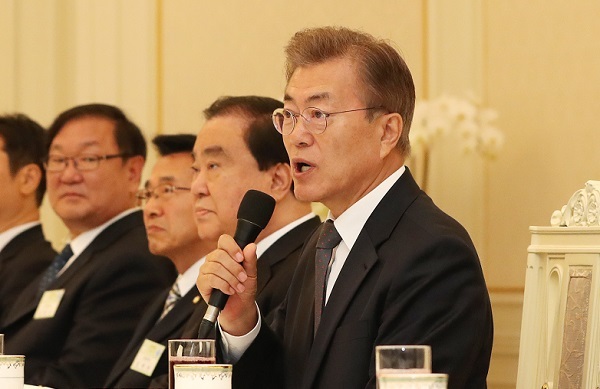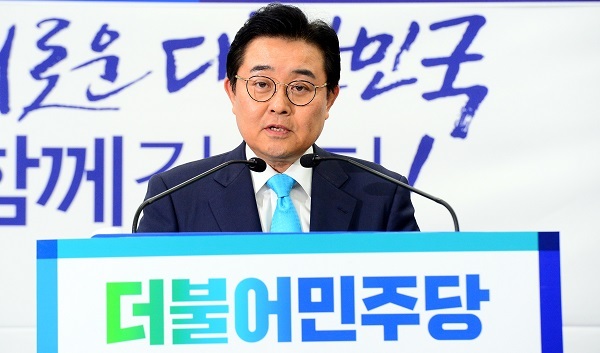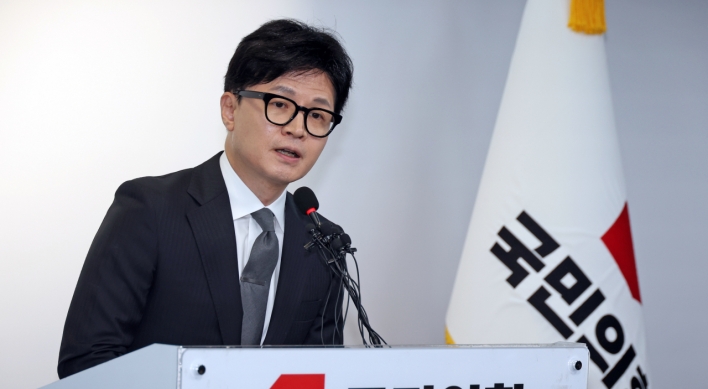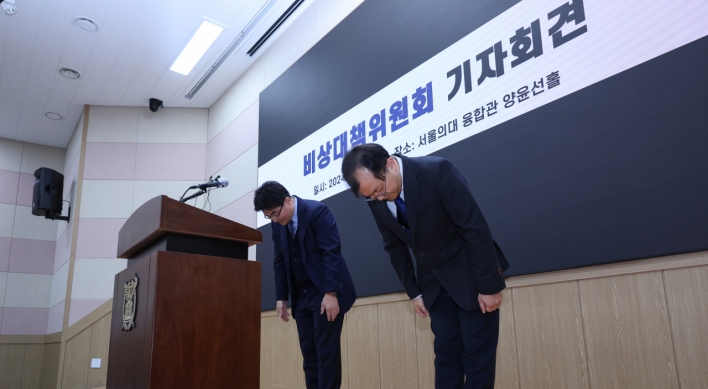[News Focus] Jobs plan could test Moon’s ties with parliament
Opposition parties call new president’s state-funded job creation plan populism
By Korea HeraldPublished : May 16, 2017 - 15:24
President Moon Jae-in’s plan to draw up a special budget to hire more teachers, firefighters and policemen could mark the beginning of the end of a honeymoon between the newly minted liberal leader and the National Assembly.
Following up on Moon’s directive on jobs policies, his first since taking office last week, the Cabinet on Tuesday approved a set of plans to kick off a jobs creation committee. The Finance Ministry is also reviewing the possibility of a supplementary budget of 10 trillion won ($8.9 billion) so as to hire 12,000 more public servants in the second half of the year, according to Cheong Wa Dae and ministry officials.
Following up on Moon’s directive on jobs policies, his first since taking office last week, the Cabinet on Tuesday approved a set of plans to kick off a jobs creation committee. The Finance Ministry is also reviewing the possibility of a supplementary budget of 10 trillion won ($8.9 billion) so as to hire 12,000 more public servants in the second half of the year, according to Cheong Wa Dae and ministry officials.

The presidential office has not yet voiced out its blueprint on the “employment budget,” but President Moon’s emphasis on jobs during his first few days in office have increasingly been alluding at an imminent action.
Opposition parties -- from center to far-right -- are set to oppose what they see as a populist fiscal plan.
“A supplementary budget may only be allowed upon the legislature’s consent and in outbreak situations such as an economic recession,” Rep. Cho Bae-sook, chief policymaker of the centrist opposition People’s Party, said during a party meeting Monday, letting out disapproval over the extra budget.
The conservative Liberty Korea Party made clear its opposition to the envisioned plan.
“We cannot agree to an extra budget devoted to creating 810,000 new jobs, as it will eventually weigh down upon the people,” said the party’s policy committee chief Rep. Lee Hyun-jae.
It also took issue with the Finance Ministry’s flip-flopping on the issue.
“It has only been some two weeks since Finance Minister and Deputy Prime Minister Yoo Il-ho publicly dismissed the idea of an extra budget,” he said.
The Finance Ministry, after the new president took office, released a monthly report in which it said it would set aside a supplementary budget to help create jobs.
During the election campaign, Moon pledged to create some 810,000 quality new jobs in the public sector so as to encourage the private sector to follow suit.
The extensive hiring plan drew mixed responses from rival camps, some underlining the need to address the job market crisis and others pointing out the lack of budget and the consequent tax burden.
“To say that the government’s job is to create an environment where companies can hire more people is like you’re going to do nothing to fix the current employment crisis. That approach has failed. We need to try a new tactic,” Moon said in defense of his vision during a television debate.
Political watchers say that the extra budget plan could act as a test bed for the new state chief not only to fulfill one of his signature campaign pledges but also to demonstrate his coordination and communication capacity in state affairs.

Jun Byung-hun, the president’s chief political affairs adviser, said the president is unlikely to push ahead with his job agenda without the consent of the parliament.
“We should refrain from pushing (the opposition) for consent and cooperation even before the details (of the budget plan) take shape,” said the new presidential aide during his meeting with individual party chiefs on Monday, hinting that he would later talk the parties into advocating the budget bill.
Despite the president’s determination and his new adviser’s flexible communication tone, it nevertheless remains for the Blue House to persuade the parliament that the current labor market situation is serious enough to justify an emergency budget.
A supplementary budget has often been adopted as a solution to revitalize the market and to boost employment. The former Park Geun-hye administration, too, drew up 11 trillion won in extra budget in September last year amid sluggish domestic economy and ailing exports.
The difference this year, however, is that the 10 billion won budget is entirely dedicated to boosting employment, reflecting that the new government takes the current labor market status as a near equivalent to a mass layoff.
The National Finance Act states that the adoption of a supplementary budget should be limited to cases of natural disasters or significant changes in economic situations such as economic recession, mass layoffs, or changes in inter-Korea relationship.
Moon’s Democratic Party of Korea holds 120 of the 300 seats of the parliament, while the conservative Liberty Korea Party has 107 and the People‘s Party controls 40. The rest are shared by the splinter conservative Bareun Party (20), far-left Justice Party (six), far-right Saenuri Party (one) and five independent lawmakers. One seat is vacant.
Passing a budget bill requires more than half of lawmakers in attendance and a majority of those voting for it.
By Bae Hyun-jung (tellme@heraldcorp.com)
-
Articles by Korea Herald


![[Exclusive] Korean military set to ban iPhones over 'security' concerns](http://res.heraldm.com/phpwas/restmb_idxmake.php?idx=644&simg=/content/image/2024/04/23/20240423050599_0.jpg&u=20240423183955)

![[Graphic News] 77% of young Koreans still financially dependent](http://res.heraldm.com/phpwas/restmb_idxmake.php?idx=644&simg=/content/image/2024/04/22/20240422050762_0.gif&u=)




![[Pressure points] Leggings in public: Fashion statement or social faux pas?](http://res.heraldm.com/phpwas/restmb_idxmake.php?idx=644&simg=/content/image/2024/04/23/20240423050669_0.jpg&u=)









